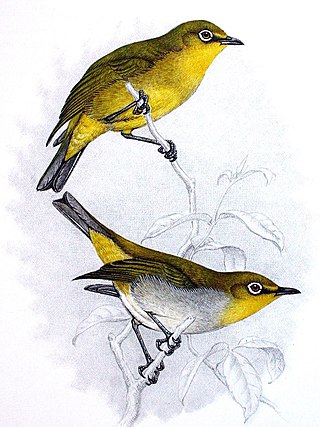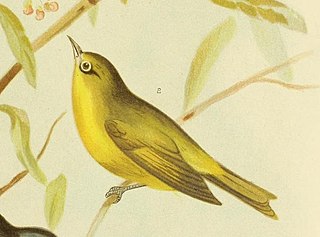
Zosterops is a genus of passerine birds containing the typical white-eyes in the white-eye family Zosteropidae. The genus has the largest number of species in the white-eye family. They occur in the Afrotropical, Indomalayan, and Australasian realms. Typical white-eyes have a length of between 8 and 15 cm. Their most characteristic feature is a conspicuous white feather ring around the eye, though some species lack it. The species in this group vary in the structural adaptations of the tongue. The Zosterops [griseotinctus] group is an example of a "great speciator" inhabiting a vast area and showing a remarkable morphological differentiation on islands, some of which maybe as close as 2 km (1.2 mi) apart.

The Indian white-eye, formerly the Oriental white-eye, is a small species of passerine bird in the white-eye family. It is a resident breeder in open woodland on the Indian subcontinent. They forage in small groups, feeding on nectar and small insects. They are easily identified by the distinctive white eye-ring and overall yellowish upperparts. The range previously extended eastwards to Southeast Asia, Indonesia and Malaysia. Their name was recently changed due to previous members of Zosterops palpebrosus in Southeast Asia being renamed to a new species, making the Indian White-eye a more geographically accurate term for this species.

The Sri Lanka white-eye is a small passerine bird in the white-eye family, which is endemic to Sri Lanka. It is a resident breeder in forests, gardens and plantations, mainly in the highlands.

The Cape white-eye is a small passerine bird in the white-eye family. It is native to southern Africa. It is commonly found in suburbia, parks and gardens, besides a variety of mesic to well-watered habitats.

The white-eyed tody-tyrant is a species of bird in the family Tyrannidae, the tyrant flycatchers.

The Abyssinian white-eye or white-breasted white-eye is a small passerine bird belonging to the genus Zosterops in the white-eye family Zosteropidae. It is native to north-east Africa and southern Arabia.

The canary white-eye or yellow white-eye is a species of white-eye endemic to northern Australia in subtropical or tropical mangrove forests. Its common name reflects the circle of white feathers around its eye.

Heuglin's white-eye, also known as the Ethiopian white-eye, is a species of bird in the family Zosteropidae. It is found in north-eastern and eastern Africa, primarily in Ethiopia and Kenya. Its natural habitats range from subtropical or tropical moist montane forests, to subtropical or tropical high-altitude shrubland, plantations, and rural gardens.

The grey-throated white-eye is a species of bird. Its family, the Zosteropidae, is probably not valid and belongs in the Timaliidae instead. It is also known as Zosterops ugiensis because Z. rendovae has often been used for the Solomons white-eye.

The northern yellow white-eye, formerly the African yellow white-eye, is a species of bird in the family Zosteropidae. It is found across sub-Saharan Africa, from Senegal in the west across to southern Sudan in the east and south to northern Angola.
The Seram white-eye is a small passerine bird in the white-eye family. It is an endemic resident breeder in open woodland in Seram, Indonesia.

The Togian white-eye is a species of bird in the family Zosteropidae.
The Mbulu white-eye is a bird species in the family Zosteropidae. It is found in southern Kenya and northern Tanzania.

The pale white-eye also known as Kenya white-eye is a bird species in the family Zosteropidae. It is found in central and eastern Kenya and in eastern Tanzania.
The south Pare white-eye is a bird species in the family Zosteropidae. Its range is restricted to the southern region of the Pare Mountains in northeastern Tanzania.

Hume's white-eye is a bird species in the family Zosteropidae. It is found in upland areas of Myanmar, southern Thailand, the Malay Peninsula and Borneo.

The sangkar white-eye is a bird species in the family Zosteropidae. It is also known as the Sunda white-eye. It is found in forested habitats on the Indonesian islands of Java and Bali. In Java it is typically found at elevations between 200–1,600 m (660–5,250 ft), but it sometimes occurs at lower elevations as well.

The southern yellow white-eye is a bird species in the family Zosteropidae. It is found in parts of southern Africa. It was formerly considered conspecific with the African yellow white-eye.
The green white-eye is a bird species in the family Zosteropidae. It is found in Tanzania, Uganda and the Democratic Republic of the Congo.

The Meratus white-eye is a species of bird in the white-eye family, Zosteropidae. The species was described in 2021 by the Indonesian ornithologist Mohammed Irham and his colleagues based on genetic, morphological, and vocal differences from other Zosterops white-eyes. It is endemic to the Meratus Mountains of Indonesian Borneo, where it has been recorded from Mount Besar and Mount Karokangen. It inhabits the mid and lower storeys of closed-canopy montane forests at elevations between 1,300 and 1,650 m. It is a typical Zosterops white-eye, with deep olive-green upperparts, yellower underparts, a yellow stripe across the lores, and a distinctive bicoloured bill. Adults have a length of around 11–12 cm (4.3–4.7 in) and a mass of 8.5–9.5 g (0.30–0.34 oz). Both sexes look alike.
















